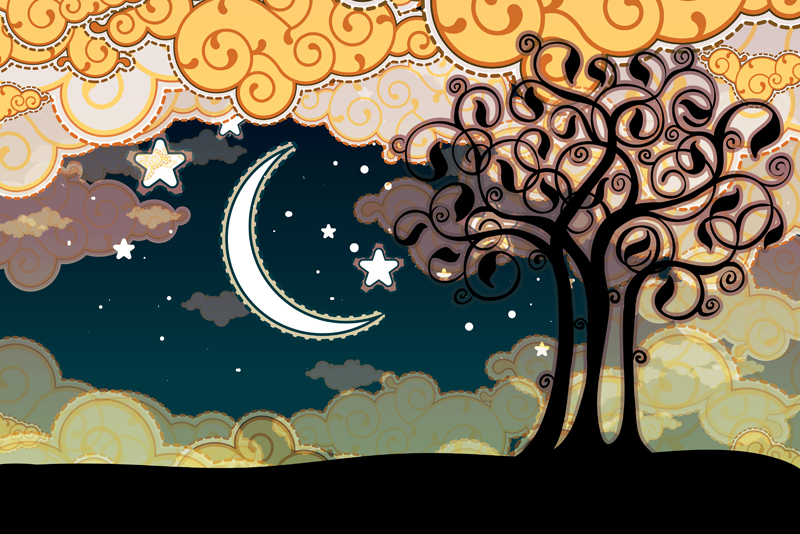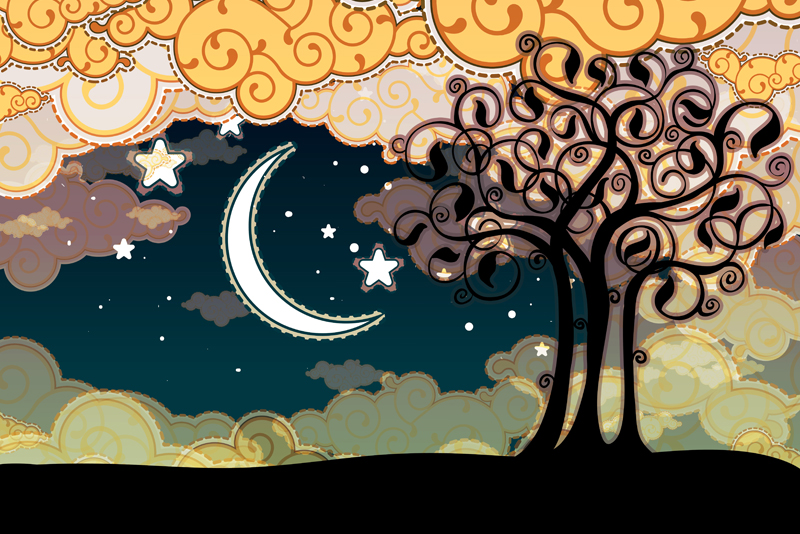Developing and Enhancing Your Visualization Skills

The ability to visualize is a key skill in most forms of Pagan practice. The casting of the circle, using magick, and working with other realms of existence all require the ability to see in ‘your minds’ eye’ or hallucinate in front of you things happening, or entities appearing. So it comes as quite a shock to many Pagans when they encounter someone who is incapable of conscious visualization.
The predominance in our society of films, television and other visual media tends to make most people think that everyone thinks in pictures. However there are many people who use the filter of other senses – such as feelings/emotions and inner dialogue – to perceive and interact with the world. A friend of mine, who I met on the hypnotherapy course I was doing, is such a person. She is a very auditory individual, liking music and sensitive to the nuances of voice tone and timbre, something that was particularly useful in doing the counselling part of our training.
I, on the other hand, am a kinaesthetic; feelings based person, sensitive to the movement, taste, texture, and ‘flow’ of an environment or situation. When I began to practice magick I learned to visualize by playing “Kim’s’ Game” a lot. This is a game where items are placed on a tray by someone else and covered with a cloth, then the tray is uncovered for a minute (to begin with) before the cover is replaced. You then have to describe what was on the tray in as much detail as possible, along with its’ relationship to other items on the tray. As your visual memory developed the time the tray was uncovered was shortened, and more things added. Further developments to the game included trying to trick the person by asking about things that were not on the tray, or what the design of the tray was.
The game comes from the Rudyard Kipling book “Kim” where it forms part of the main characters training in observation. The book itself is well worth reading for how various Oriental spiritual paths such as Buddhism appeared to the Western mind of the late nineteenth century. I had a great deal of difficulty remembering what was on the tray, until I read the book and discovered the origin of the game. Most significantly that in the book the person was allowed to handle the items as well as just look at them. When I handled and looked at them my score rose drastically within a week!
The next discovery I made was learning to feel with my eyes. This may sound a little strange but most people seem to see the world as a flat screen in front of them rather than in the three dimensions it actually is. By becoming aware of the perspective, distance and surfaces in the line of sight I found I could “cross over” my sense of sight with the sense of touch and literally feel what I was looking at.
Using these techniques helped hone my visualization skills to the point of being able to use them in magick and ritual. To my surprise I began to get better results with my visualization techniques than many of my more experienced friends. It took a talk with Jim, my Brujo (Mexican Wizard) friend, to help me understand why this was happening.
“You both see and feel the ingredients of your magick” he explained. “Many magick users just see their intentions rather than use any other senses. Others work purely with chanting and words of power, and some use dolls and symbolic objects. Each is a powerful system on its’ own but when you combine them with feeling……..POW!” He mimed a big explosion.
This combination effect is the key to enhancing your visualization abilities. Use your dominant perception to lead you into successful visualization. I helped my friend from the hypnotherapy course to visualize by using her fondness for music. She likes playing the piano so I had her imagine playing the piano and feeling the sensation of the piano keys under her fingers, then seeing the piano she was playing and, finally, expanding that mental picture to include the rest of the room. From there it was easy to enable her to visualize other places and situations.
The first few times she did this the change of perception was so different from her usual ways of interacting with the world, that when she came back to normal waking consciousness she had no memory of anything after feeling the sensation of the piano keys.
This is very common in some types of pathworking and working with different cultural pantheons, but as your ability to visualize grows these ‘blank spots’ will fade away.
Remember, use your strongest sense you use for perceiving the world to attain your goal of successful visualization. For example if you are a kinaesthetic (feelings) person you could imagine the heat of the sun on your skin, then see the sun in the sky, and expand that into the visualization of an outdoor scene. If hearing is the thing you use most then use the association of the sound to a particular item and build up the scene from there as my friend did.
This ‘sensory crossover’ is one of the easiest ways of developing and enhancing your skills of visualization, then adding to them by incorporating your other senses to make the experience as vivid as possible. In doing this you can augment visualization to make it a dynamic skill that improves both your connection to the Divine and any magickal practices you may perform.
The predominance in our society of films, television and other visual media tends to make most people think that everyone thinks in pictures. However there are many people who use the filter of other senses – such as feelings/emotions and inner dialogue – to perceive and interact with the world. A friend of mine, who I met on the hypnotherapy course I was doing, is such a person. She is a very auditory individual, liking music and sensitive to the nuances of voice tone and timbre, something that was particularly useful in doing the counselling part of our training.
I, on the other hand, am a kinaesthetic; feelings based person, sensitive to the movement, taste, texture, and ‘flow’ of an environment or situation. When I began to practice magick I learned to visualize by playing “Kim’s’ Game” a lot. This is a game where items are placed on a tray by someone else and covered with a cloth, then the tray is uncovered for a minute (to begin with) before the cover is replaced. You then have to describe what was on the tray in as much detail as possible, along with its’ relationship to other items on the tray. As your visual memory developed the time the tray was uncovered was shortened, and more things added. Further developments to the game included trying to trick the person by asking about things that were not on the tray, or what the design of the tray was.
The game comes from the Rudyard Kipling book “Kim” where it forms part of the main characters training in observation. The book itself is well worth reading for how various Oriental spiritual paths such as Buddhism appeared to the Western mind of the late nineteenth century. I had a great deal of difficulty remembering what was on the tray, until I read the book and discovered the origin of the game. Most significantly that in the book the person was allowed to handle the items as well as just look at them. When I handled and looked at them my score rose drastically within a week!
The next discovery I made was learning to feel with my eyes. This may sound a little strange but most people seem to see the world as a flat screen in front of them rather than in the three dimensions it actually is. By becoming aware of the perspective, distance and surfaces in the line of sight I found I could “cross over” my sense of sight with the sense of touch and literally feel what I was looking at.
Using these techniques helped hone my visualization skills to the point of being able to use them in magick and ritual. To my surprise I began to get better results with my visualization techniques than many of my more experienced friends. It took a talk with Jim, my Brujo (Mexican Wizard) friend, to help me understand why this was happening.
“You both see and feel the ingredients of your magick” he explained. “Many magick users just see their intentions rather than use any other senses. Others work purely with chanting and words of power, and some use dolls and symbolic objects. Each is a powerful system on its’ own but when you combine them with feeling……..POW!” He mimed a big explosion.
This combination effect is the key to enhancing your visualization abilities. Use your dominant perception to lead you into successful visualization. I helped my friend from the hypnotherapy course to visualize by using her fondness for music. She likes playing the piano so I had her imagine playing the piano and feeling the sensation of the piano keys under her fingers, then seeing the piano she was playing and, finally, expanding that mental picture to include the rest of the room. From there it was easy to enable her to visualize other places and situations.
The first few times she did this the change of perception was so different from her usual ways of interacting with the world, that when she came back to normal waking consciousness she had no memory of anything after feeling the sensation of the piano keys.
This is very common in some types of pathworking and working with different cultural pantheons, but as your ability to visualize grows these ‘blank spots’ will fade away.
Remember, use your strongest sense you use for perceiving the world to attain your goal of successful visualization. For example if you are a kinaesthetic (feelings) person you could imagine the heat of the sun on your skin, then see the sun in the sky, and expand that into the visualization of an outdoor scene. If hearing is the thing you use most then use the association of the sound to a particular item and build up the scene from there as my friend did.
This ‘sensory crossover’ is one of the easiest ways of developing and enhancing your skills of visualization, then adding to them by incorporating your other senses to make the experience as vivid as possible. In doing this you can augment visualization to make it a dynamic skill that improves both your connection to the Divine and any magickal practices you may perform.

Related Articles
Editor's Picks Articles
Top Ten Articles
Previous Features
Site Map
Content copyright © 2023 by Ian Edwards. All rights reserved.
This content was written by Ian Edwards. If you wish to use this content in any manner, you need written permission. Contact Ian Edwards for details.



